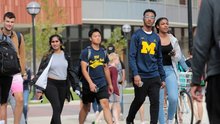Found 52 resources.
0
0
0

In the 2020-21 school year, more than 25 million children and youth – roughly half of all elementary and secondary students in the United States – attended schools in school districts that lacked dedicated funding to identify and support students experiencing homelessness. This significant funding gap increases the likelihood that many children and youth experiencing homelessness will not be identified, and even in cases where they are identified, that they will not receive the educational protections and services that can stabilize their education and their lives. Ensuring access to these...
Topics: Early childhood, Education, Funding, Homelessness, Low-income, Research, School-readiness, Stability, Youth
 Shared by Sandra Ware
on Feb 21, 2023
Shared by Sandra Ware
on Feb 21, 2023 0
0
0

Trends in Housing Assistance and Who it Serves
Topics: Community development, Disabilities, Education, Funding, Health, Homelessness, Housing, Legislation & Policy, Low-income, Partnerships, Research, Seniors, Workforce development, Youth
 Shared by Keely Stater
on Sep 10, 2019
Shared by Keely Stater
on Sep 10, 2019 0
0
0
Authored by Civic and the Everyone Graduates Center at the Johns Hopkins University School of Education, and released annually in partnership with the Alliance for Excellent Education and America’s Promise Alliance, the Building a Grad Nation report examines both progress and challenges toward reaching the GradNation campaign goal of a national on-time graduation rate of 90 percent.
Topics: Education, Low-income, Research, Youth
 Shared by Housing Is
on Jun 11, 2019
Shared by Housing Is
on Jun 11, 2019 0
0
0
The Youth Risk Behavior Survey (YRBS) was first developed by the Centers for Disease Control and Prevention (CDC) in 1990 to assess the health risk behaviors of youth and adults in the United States. For the first time since the survey has been widely administered, the 2017 YRBS optional question list included two questions pertaining to homelessness. SchoolHouse Connection analyzed demographic and risk factor data from the YRBS in 17 states[1], comparing high school students experiencing homelessness and those not experiencing homelessness. This series shares the striking and heartbreaking...
Topics: Education, Homelessness, Low-income, Research, Youth
 Shared by Housing Is
on May 21, 2019
Shared by Housing Is
on May 21, 2019 0
0
0
This report highlights the development and implementation of a mentoring program for college students in foster care in New York City through a strategic partnership that was forged among New York City’s Administration for Children’s Services, Goldman Sachs and Casey Family Programs. The program is designed to expose youth to professional and experiential opportunities through a series of one-on-one meetings and group workshops. Students have the opportunity to become familiar with the Goldman Sachs corporate environment, understand various business sectors and explore the roles and...
Topics: Child welfare, Foster care, Partnerships, Research, Workforce development, Youth
 Shared by Housing Is
on May 21, 2019
Shared by Housing Is
on May 21, 2019 0
0
0
On May 9, the Brookings Institution hosted an event to discuss the subsequent report, “A Roadmap to Reducing Child Poverty.” The event featured comments from Greg Duncan, who served as Chair of the Committee on Building an Agenda to Reduce the Number of Children in Poverty by Half in 10 Years, as well as a panel discussion on the report, its recommendations, and barriers to implementation. A second panel highlighted national and state policy perspectives of the consensus study report.
Topics: Early childhood, Funding, Housing, Legislation & Policy, Low-income, Research, Youth
 Shared by Housing Is
on May 13, 2019
Shared by Housing Is
on May 13, 2019 0
0
0

That’s according to the fourth and largest survey of college students’ ability to afford food and housing
Topics: Food insecurity, Low-income, Nutrition, Post-secondary, Research, Youth
 Shared by Housing Is
on May 6, 2019
Shared by Housing Is
on May 6, 2019 0
0
0
College Promise programs aim to make students believe they can afford college, and to give them the opportunity to go to college and earn degrees without taking on significant debt. At the core of all College Promise programs is a scholarship: All eligible College Promise students receive scholarships that may cover up to 100 percent of tuition and fees at postsecondary institutions. Additionally, many Promise programs are designing, implementing, and refining additions to their models by providing students with support services once they enroll in college. MDRC’s College Promise Success...
Topics: Education, Low-income, Post-secondary, Research, Youth
 Shared by Housing Is
on Apr 24, 2019
Shared by Housing Is
on Apr 24, 2019 0
0
0
Investments in the postsecondary success of parents with young children can increase attainment of credentials leading to good jobs, bring children the benefits of high-quality learning environments, promote later college-going among children, and improve family economic security across generations. This factsheet provides figures on the student parent population based on the latest National Postsecondary Student Aid Study data.
Topics: Dual-generation, Early childhood, Post-secondary, Research, Youth
0
0
0
Resources from Ascend at The Aspen Institute
Topics: Asset building, Child welfare, Dual-generation, Early childhood, Family engagement, Research, Youth
0
0
0
The #RealCollege survey is the nation’s largest annual assessment of basic needs security among college students. The survey, which specifically evaluates access to affordable food and housing, began in 2015 under the Wisconsin HOPE Lab. This report describes the results of the #RealCollege survey administered at nearly half of the schools in the California Community College system in the fall of 2016 and 2018.
Topics: Homelessness, Low-income, Post-secondary, Research, West Coast, Youth
 Shared by Housing Is
on Mar 13, 2019
Shared by Housing Is
on Mar 13, 2019 0
0
0

The number of kids enrolled in Medicaid and the Children’s Health Insurance Program (CHIP) — two government health plans for the poor — fell by nearly 600,000 in the first 11 months of 2018, a precipitous drop that has puzzled and alarmed many health policy analysts, while several states say it reflects the good news of an improving economy.
Topics: Affordable Care Act, Child welfare, Early childhood, Health, Legislation & Policy, Low-income, Medicaid / Medicare, Research, Youth
 Shared by Housing Is
on Mar 8, 2019
Shared by Housing Is
on Mar 8, 2019 0
0
0
One out of every 10 young people between the ages of 16 and 24 is neither working nor in school. These “disconnected” young people face an uphill battle finding work and are at risk of economic hardship well into adulthood. Although there are many programs that aim to reconnect young people to education and employment, findings from evaluations of these programs have been mixed. The evidence base has grown substantially in the past several months, though, as studies of three programs — YouthBuild, Year Up, and New York City’s Young Adult Internship Program (YAIP) — have released new findings...
Topics: Asset building, Low-income, Mobility, Research, Workforce development, Youth
 Shared by Housing Is
on Mar 8, 2019
Shared by Housing Is
on Mar 8, 2019 0
0
0
Welcome to the Food Research & Action Center’s winter issue of ResearchWire. This quarterly newsletter focuses on the latest research, reports, and resources from government agencies, academic researchers, think tanks, and elsewhere at the intersection of food insecurity, poverty, the federal nutrition programs, and health.
Topics: Child welfare, Food insecurity, Funding, Health, Legislation & Policy, Low-income, Nutrition, Research, Youth
0
0
0

Homelessness among students enrolled in schools from kindergarten through 12th grade has increased 70 percent over the last decade.
Topics: Child welfare, Education, Homelessness, Housing, Research, Youth
 Shared by Housing Is
on Feb 25, 2019
Shared by Housing Is
on Feb 25, 2019 0
0
0
This report marks the thirteenth school year for which the U.S. Department of Education (ED) has collected annual performance data from all states for the Education for Homeless Children and Youth (EHCY) program. The EDFacts Submission System allows for the collection of unduplicated data on students who experienced homelessness and were reported as enrolled in public schools, even if they attend more than one local educational agency (LEA) during the school year. This report draws from that data to provide the only publicly available compilation of unduplicated data for the EHCY program.
Topics: Education, Homelessness, Housing, Research, Youth
0
0
0
FRESNO COUNTY, California - Research shows that a child's enviornment, where they live, can have a huge impact on the outcome of their education. We take a look at how Fresno County's philosophy about public housing is having a positive impact on families.
Topics: Broadband, CLPHA, Education, Housing, Low-income, Out-of-school time, Research, Youth
0
0
0

Lack of transparency about SNAP benefits leaves students confused, unable to take advantage of resources
Topics: Food insecurity, Low-income, Nutrition, Post-secondary, Research, Youth
 Shared by Housing Is
on Feb 11, 2019
Shared by Housing Is
on Feb 11, 2019 0
1
1

At a recent public meeting, Sandra Lee Fewer, a member of the city’s Board of Supervisors, asked acting librarian Michael Lambert to explore whether future library renovations might include affordable housing. Fewer hopes to leverage existing public land to create multi-story facilities that include both libraries and housing.
Topics: Community development, Homelessness, Housing, Literacy, Low-income, Partnerships, Place-based, Research, Youth
 Shared by Housing Is
on Jan 29, 2019
Shared by Housing Is
on Jan 29, 2019 0
0
0
Postsecondary attainment is increasingly necessary to move out of poverty and homelessness and live a healthy, productive life. Yet youth experiencing homelessness face barriers in transitioning from secondary to postsecondary education, as well as barriers to financial aid, college retention, and college completion. This fact sheet summarizes existing data and information on the higher education experiences of homeless youth.
Topics: Education, Food insecurity, Homelessness, Housing, Post-secondary, Research, Youth
0
0
0

There isn't federal data on food insecurity among college students nationally, so the GAO reviewed 31 studies on the topic, showing that most concluded that over a third of college students don't always have enough to eat.
Topics: Education, Food insecurity, Health, Legislation & Policy, Low-income, Nutrition, Post-secondary, Research, Youth
 Shared by Housing Is
on Jan 16, 2019
Shared by Housing Is
on Jan 16, 2019 0
0
0

This short article expands on the press release issued last month by six national organizations. It explains why HUD’s data are so contentious, and why other data sources provide a more accurate picture of children, youth, and family homelessness.
Topics: Homelessness, Housing, Metrics, Research, Youth
0
0
0
CLPHA’s Education Working Group hosts a webinar including presentations on efforts from the Chicago Housing Authority to work with residents on pursuing postsecondary opportunities, as well as an update from HUD’s Office of Policy Development & Research on data collection around tracking and increasing FAFSA utilization.
Topics: CLPHA, Cost effectiveness, Data sharing, Education, Funding, Housing, Housing Is Working Group, Low-income, Metrics, Midwest, Post-secondary, Research, Stability, Youth
0
0
0
ASAP is a comprehensive program that provides students with up to three years of financial and academic support and other support services to address multiple barriers to student success, with the goal of helping more students graduate within three years. MDRC’s random assignment evaluation of CUNY ASAP found that after three years, 40 percent of ASAP students graduated compared with just 22 percent of control group students. After six years, ASAP students continued to outperform the control group, with 51 percent of the program group earning degrees compared with 41 percent of the control...
Topics: Education, Low-income, Midwest, Post-secondary, Research, Youth

